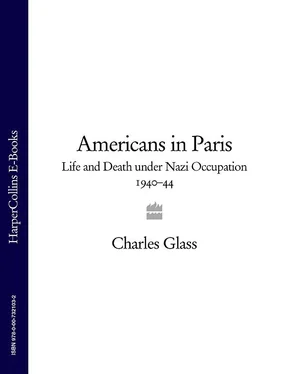LIFE AND DEATH UNDER NAZI OCCUPATION 1940–1944
CHARLES GLASS

Copyright CONTENTS COVER TITLE PAGE COPYRIGHT DEDICATION INTRODUCTION PART ONE: 14 June 1940 1 The American Mayor of Paris 2 The Bookseller 3 The Countess from Ohio 4 All Blood Runs Red 5 Le Millionnaire américain 6 The Yankee Doctor PART TWO: 1940 7 Bookshop Row 8 Americans at Vichy 9 Back to Paris 10 In Love with Love 11 A French Prisoner with the Americans 12 American Grandees 13 Polly’s Paris 14 Rugged Individualists 15 Germany’s Confidential American Agent PART THREE: 1941 16 The Coldest Winter 17 Time to Go? 18 New Perils in Paris 19 Utopia in Les Landes 20 To Resist, to Collaborate or to Endure 21 Enemy Aliens PART FOUR: 1942 22 First Round-up 23 The Vichy Web 24 The Second Round-up 25 ‘Inturned’ 26 Uniting Africa 27 Americans Go to War 28 Murphy Forgets a Friend 29 Alone at Vittel 30 The Bedaux Dossier PART FIVE: 1943 31 Murphy versus Bedaux 32 Sylvia’s War 33 German Agents? 34 A Hospital at War 35 The Adolescent Spy 36 Clara under Suspicion 37 Calumnies PART SIX: 1944 38 The Trial of Citizen Bedaux 39 The Underground Railway 40 Conspiracies 41 Springtime in Paris 42 The Maquis to Arms! 43 Résistants Unmasked 44 Via Dolorosa 45 Schwarze Kappelle 46 Slaves of the Reich 47 One Family Now 48 The Paris Front 49 Tout Mourir PART SEVEN: 24–26 August 1944 50 Liberating the Rooftops 51 Libération, not Liberation EPILOGUE ENDNOTES ACKNOWLEDGEMENTS SELECT BIBLIOGRAPHY INDEX BY THE SAME AUTHOR ABOUT THE PUBLISHER
Harper Press An imprint of HarperCollins Publishers 1 London Bridge Street London, SE1 9GF, UK www.harpercollins.co.uk
Visit our authors’ blog: www.fifthestate.co.ukLOVE THIS BOOK? WWW.BOOKARMY.COM
First published in Great Britain by Harper Press in 2009
1
Copyright © Charles Glass 2009
Maps and Endpapers © www.joygosney.co.uk
Charles Glass asserts the moral right to
be identified as the author of this work
A catalogue record for this book
is available from the British Library
All rights reserved under International and Pan-American Copyright Conventions. By payment of the required fees, you have been granted the non-exclusive, non-transferable right to access and read the text of this e-book on-screen. No part of this text may be reproduced, transmitted, down-loaded, decompiled, reverse engineered, or stored in or introduced into any information storage and retrieval system, in any form or by any means, whether electronic or mechanical, now known or hereinafter invented, without the express written permission of HarperCollins eBooks.
Ebook Edition © MARCH 2009 ISBN: 9780007321032
Version: 2016-03-14
To the memory and glorious spirit of Charles Glass, Jr.,
my father and unwavering partisan,
born 11 October, 1920, died 2 February, 2008.
COVER
TITLE PAGE Americans in Paris LIFE AND DEATH UNDER NAZI OCCUPATION 1940–1944 CHARLES GLASS
COPYRIGHT
DEDICATION
INTRODUCTION
PART ONE: 14 June 1940
1 The American Mayor of Paris
2 The Bookseller
3 The Countess from Ohio
4 All Blood Runs Red
5 Le Millionnaire américain
6 The Yankee Doctor
PART TWO: 1940
7 Bookshop Row
8 Americans at Vichy
9 Back to Paris
10 In Love with Love
11 A French Prisoner with the Americans
12 American Grandees
13 Polly’s Paris
14 Rugged Individualists
15 Germany’s Confidential American Agent
PART THREE: 1941
16 The Coldest Winter
17 Time to Go?
18 New Perils in Paris
19 Utopia in Les Landes
20 To Resist, to Collaborate or to Endure
21 Enemy Aliens
PART FOUR: 1942
22 First Round-up
23 The Vichy Web
24 The Second Round-up
25 ‘Inturned’
26 Uniting Africa
27 Americans Go to War
28 Murphy Forgets a Friend
29 Alone at Vittel
30 The Bedaux Dossier
PART FIVE: 1943
31 Murphy versus Bedaux
32 Sylvia’s War
33 German Agents?
34 A Hospital at War
35 The Adolescent Spy
36 Clara under Suspicion
37 Calumnies
PART SIX: 1944
38 The Trial of Citizen Bedaux
39 The Underground Railway
40 Conspiracies
41 Springtime in Paris
42 The Maquis to Arms!
43 Résistants Unmasked
44 Via Dolorosa
45 Schwarze Kappelle
46 Slaves of the Reich
47 One Family Now
48 The Paris Front
49 Tout Mourir
PART SEVEN: 24–26 August 1944
50 Liberating the Rooftops
51 Libération, not Liberation
EPILOGUE
ENDNOTES
ACKNOWLEDGEMENTS
SELECT BIBLIOGRAPHY
INDEX
BY THE SAME AUTHOR
ABOUT THE PUBLISHER
IN THE PLAZA WHERE THE Boulevard Saint-Michel approaches the River Seine, water cascades down stone blocks of a vast monumental tribute to those who endured the four-year German occupation of Paris. The Archangel Michael stands guard above an old memorial that was rededicated after the Second World War, above all, to the civilians killed nearby when the people of Paris finally rose against their oppressors in the summer of 1944. Reading the inscriptions and looking at the stone lions beside the shallow pool, I used to imagine life during the fifty months from 14 June 1940, when the Germans marched proudly into Paris, and 25 August 1944, when they retreated in shame. I wondered how I would have behaved while the Wehrmacht ruled the cultural capital of Europe. Many books and films on the period depicted French behaviour that varied from self-sacrifice and heroism to treason and complicity in genocide. But what would I, as an American, have done? Was it possible to survive until liberation day, 26 August 1944, without compromising or collaborating? Would I have risked my life, or the lives of my family, by fighting for the Resistance? Or would I have waited patiently with the majority of Parisians for the German retreat?
Nearly 30,000 Americans lived in or near Paris before the Second World War. Those who refused to leave were, paraphrasing Dickens, the best and the worst of America. Like the French, some collaborated, others resisted. The Germans forced some into slave labour. At least one was taken back to the United States to face a trial for treason. Americans in Paris under the occupation were among the most eccentric, original and disparate collection of their countrymen anywhere – tested as few others have been before or since. This is their story.
When Britain and France declared war on Germany for invading Poland in September 1939, American Ambassador William Bullitt advised United States citizens without vital business to leave France immediately. At least 5,000 ignored him and stayed. While many had professional and family ties to Paris, the majority had a peculiarly American love for the city that had its origins in the debt the young United States owed to the Frenchmen who volunteered with the Marquis de Lafayette to fight for American independence after 1776. The American love affair with Paris, where the United States opened its first diplomatic mission, was shared by Benjamin Franklin, John Adams (whose wife, Abigail, famously said, ‘No one leaves Paris without a feeling of tristesse ’), Thomas Jefferson, Thomas Paine, James Monroe and generations of writers, artists, musicians, diplomats, journalists, socialites and financiers. It was with a certain pride that Walt Whitman wrote, ‘I am a real Parisian.’ A year or two in Paris was a vital component in the education of any socially acceptable young American.
Читать дальше













